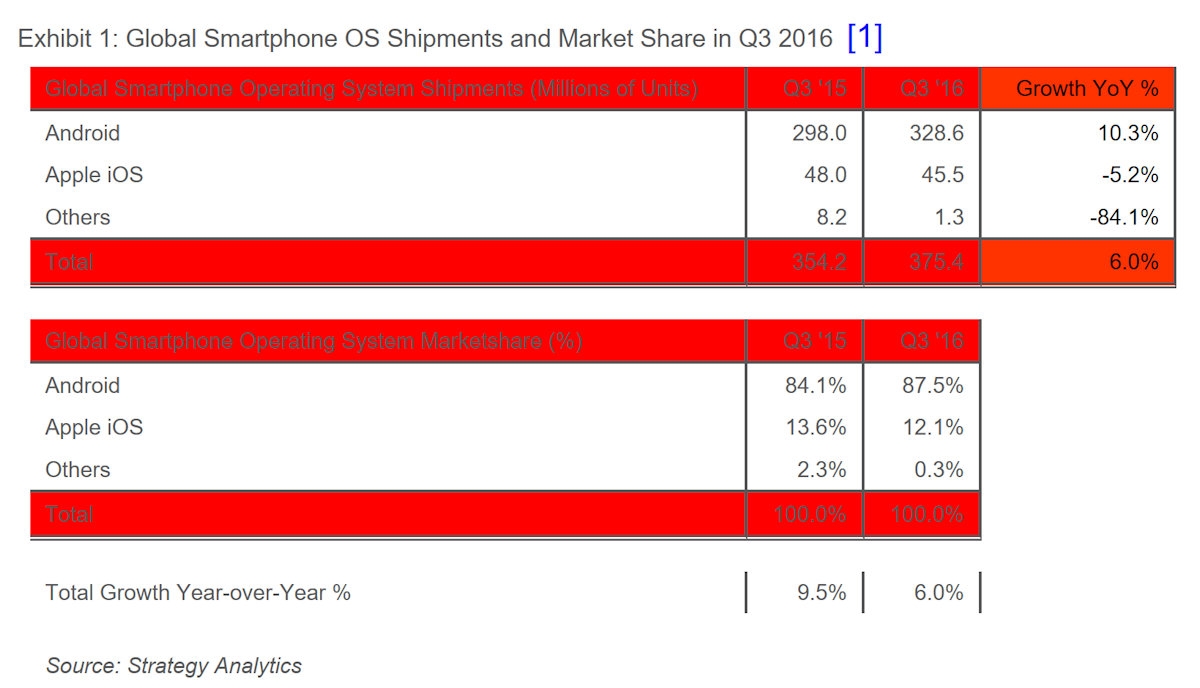Stategy Analytics: Windows Phones fall into "other" segment as they "all but disappear" from the market
3 min. read
Published on
Read our disclosure page to find out how can you help MSPoweruser sustain the editorial team Read more

With Windows Phones falling into a fraction of a percent market share in the last quarter, it should come as no surprise to regular readers that in Q3 2016 handsets running a Microsoft OS have dropped into the “other” segment and are no longer separately listed.
Strategy Analytics note Windows Phone’s loss has been Android’s gain, with the OS now running on 87.5% of new handsets sold in Q3 2016.
Neil Mawston, Executive Director at Strategy Analytics, note, “Android’s domination of global smartphone shipments remained strong in Q3 2016, with a record 88 percent of all smartphones now running Google’s OS. Android’s gain came at the expense of every major rival platform. Apple iOS lost ground to Android and dipped to 12 percent share worldwide in Q3 2016, due to a lackluster performance in China and Africa. BlackBerry and Microsoft Windows Phone have all but disappeared due to strategic shifts, while Tizen and other emerging platforms softened as a result of limited product portfolios and modest developer support.”
Woody Oh, Director at Strategy Analytics, added, “Android’s leadership of the global smartphone market looks unassailable at the moment. Its low-cost services and user-friendly software remain attractive to hardware makers, operators and consumers worldwide. However, several challenges remain for Google. The Android platform is getting overcrowded with hundreds of manufacturers, few Android device vendors make profits, and Google’s new Pixel range is attacking its own hardware partners that made Android popular in the first place.”
Linda Sui, Director at Strategy Analytics, said, “Global smartphone shipments grew 6 percent annually from 354.2 million units in Q3 2015 to 375.4 million in Q3 2016. This was the smartphone industry’s fastest growth rate for a year. Modest smartphone regrowth is being supported by emerging markets with relatively low smartphone penetration across Asia and Africa Middle East, particularly countries such as India and South Africa.”
Microsoft has made the strategic decision to continue to support Windows 10 Mobile, seemingly to maintain their support for Windows on ARM and for cellular connectivity built into an OS. They have also found partners in enterprise to carry the flag for them with premium business-focussed devices centred around vertical markets and Continuum on Phones, and of course rumours of the Surface phone refuse to die.
While committed to keeping Windows phones in the market Microsoft has also made sure to serve their customers on whatever platform they are using and it is arguable that Microsoft fans may have their best Microsoft mobile experience on an Apple or Google phone.
Even as a Microsoft fan, does it still make sense to use a Windows 10 Mobile handset as your main device? Let us know below.










User forum
0 messages